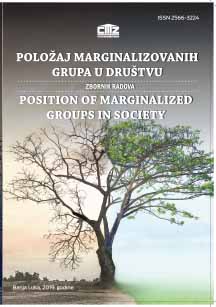SPRJEČAVANJE MARGINALIZACIJE MLADIH SKLONIH RIZIČNOM PONAŠANJU U OBRAZOVNOM SISTEMU PRIKAZ ISKUSTVA REALIZACIJE PROJEKTA
PREVENTING MARGINALIZATION OF YOUNG SKLON RISK BEHAVIOR IN EDUCATIONAL SYSTEM SHOW EXPERIENCE OF PROJECT REALIZATION
Author(s): Sanela PekićSubject(s): Social Sciences, Education, Sociology, School education, Educational Psychology, Evaluation research, Substance abuse and addiction, Social Norms / Social Control
Published by: CENTAR MODERNIH ZNANJA
Keywords: selective prevention; addiction; school; youth; parents;
Summary/Abstract: The school, after the family, is the most important organized system that can bring together almost all children, their parents and many experts from other institutions at the level of the local community. Prevention of addiction is a special type of education for healthy and non-addictive behaviour. School failure or school inadjustment is often the first predictor of risky behavior. In order not to escalate socially unacceptable behaviour, certain measures need to be taken. In this paper it will be presented a pilot project of supporting young people prone to risky behaviour that was implemented in the High School of Transport and Communications in Sarajevo from October 2018. to the end of March 2019. The project was implemented by the Association of Social Workers of Canton Canton in cooperation with the Public Institution „Therapeutic Community Kampus“ of Canton Sarajevo and the Cantonal Centre for Social Work with the support of RIPPO fund. Overall goal of the project was to contribute to development of early detection system for young people under increased risk of addiction, crisis intervention and support in the school environment in cooperation with social welfare institutions. The significance of the project is reflected in a comprehensive approach to selective addiction prevention in the school environment in order to avoid marginalisation of students prone to risky behaviour and to provide support in overcoming of the consequences of the absences from the class and other of risky behavior. The project consisted of activities intended for teachers, professional associates of the school and social welfare services, students and parents. The content of education and the level of support were adapted to the needs of each target group. Long-term results require continuity and mutual cooperation of all participants in the educational process.
Journal: DRUŠTVENE DEVIJACIJE
- Issue Year: IV/2019
- Issue No: 4
- Page Range: 449 - 455
- Page Count: 7
- Language: Bosnian

